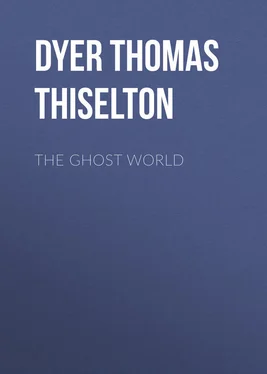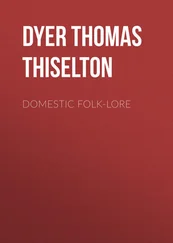Thomas Dyer - The Ghost World
Здесь есть возможность читать онлайн «Thomas Dyer - The Ghost World» — ознакомительный отрывок электронной книги совершенно бесплатно, а после прочтения отрывка купить полную версию. В некоторых случаях можно слушать аудио, скачать через торрент в формате fb2 и присутствует краткое содержание. Жанр: foreign_antique, foreign_prose, на английском языке. Описание произведения, (предисловие) а так же отзывы посетителей доступны на портале библиотеки ЛибКат.
- Название:The Ghost World
- Автор:
- Жанр:
- Год:неизвестен
- ISBN:нет данных
- Рейтинг книги:5 / 5. Голосов: 1
-
Избранное:Добавить в избранное
- Отзывы:
-
Ваша оценка:
- 100
- 1
- 2
- 3
- 4
- 5
The Ghost World: краткое содержание, описание и аннотация
Предлагаем к чтению аннотацию, описание, краткое содержание или предисловие (зависит от того, что написал сам автор книги «The Ghost World»). Если вы не нашли необходимую информацию о книге — напишите в комментариях, мы постараемся отыскать её.
The Ghost World — читать онлайн ознакомительный отрывок
Ниже представлен текст книги, разбитый по страницам. Система сохранения места последней прочитанной страницы, позволяет с удобством читать онлайн бесплатно книгу «The Ghost World», без необходимости каждый раз заново искать на чём Вы остановились. Поставьте закладку, и сможете в любой момент перейти на страницу, на которой закончили чтение.
Интервал:
Закладка:
Similarly, it is not good to weep for the dead, as it disturbs the peace and rest of the soul. In an old Danish ballad of Aage and Else, a lover’s ghost says to his mistress:
Every time thou weepest, for each tear in that flood,
The coffin I am laid in is filled with much blood.
Or, as another version has it:
Every time thou’rt joyful,
And in thy mind art glad,
Then is my grave within
Hung round with roses’ leaves.
Every time thou grievest,
And in thy mind are sad,
Then is within my coffin
As if full of clotted blood.
A German song tells us how a sister wept incessantly over her brother’s grave, but at last her tears became intolerable to the deceased, because he was detained on earth by her excessive weeping, and suffered thereby great torment. In a fit of desperation he cursed her, and in consequence of his malediction, she was changed into a cuckoo, so that she might always lament for herself. 14 14 Kelly’s Indo-European Folk-lore , pp. 127-128.
Mannhardt relates a pretty tale of a young mother who wept incessantly over the loss of her only child, and would not be comforted. Every night she went to the little grave and sobbed over it, till, on the evening preceding the Epiphany, she saw Bertha pass not far from her, followed by her troop of children. The last of these was one whose little shroud was all wet, and who seemed exhausted by the weight of a pitcher of water she carried. It tried in vain to cross a fence over which Bertha and the rest had passed; but the fond mother, at once recognising her child, ran and lifted it over. ‘Oh, how warm are mother’s arms!’ said the little one; ‘but don’t cry so much, mother, for I must gather up every tear in my pitcher. You have made it too full and heavy already. See how it has run over and wet all my shift.’ The mother cried again, but soon dried her tears.
We may compare a similar superstition among the natives of Alaska, when, if too many tears were shed by the relatives during the burial ceremonies, it was thought that the road of the dead would be muddy, but a few tears were supposed just to lay the dust. 15 15 Dorman’s Primitive Superstitions , p. 43.
The same idea is found in a Hindu dirge: ‘The souls of the dead do not like to taste the tears let fall by their kindred; weep not, therefore;’ and, according to the Edda, every tear falls as blood upon the ice-cold bosom of the dead. We may trace the belief in Ireland, and Sir Walter Scott says 16 16 In a note to Redgauntlet , Letter xi.
it was generally supposed throughout Scotland that ‘the excessive lamentation over the loss of friends disturbed the repose of the dead, and broke even the rest of the grave.’
The presence of pigeon or game feathers is said to be another hindrance to the exit of the soul; and, occasionally, in order to facilitate its departure, the peasantry in many parts of England will lay a dying man on the floor. A Sussex nurse once told the wife of a clergyman that ‘never did she see anyone die so hard as Master Short; and at last she thought – though his daughter said there were none – that there must be game feathers in the bed. So she tried to pull it from under him, but he was a heavy man, and she could not manage it alone, and there was none with him but herself, and so she got a rope and tied it round him, and pulled him right off the bed, and he went off in a minute quite comfortable, just like a lamb.’ 17 17 Folk-lore Record , i. pp. 59-60.
In Lancashire, this belief is so deep-rooted that some persons will not allow sick persons to lie on a feather-bed; while in Yorkshire the same is said of cocks’ feathers. Shakespeare alludes to the practice where Timon says 18 18 Timon of Athens , iv. 3.
—
Pluck stout men’s pillows from below their heads.
And Grose remarks: ‘It is impossible for a person to die whilst resting on a pillow stuffed with the feathers of a dove, for he will struggle with death in the most exquisite torture.’ This is also a Hindu and Mohammedan belief, and in India ‘the dying are always taken from their beds and laid on the ground, it being held that no one can die peaceably except when laid on mother earth.’ 19 19 Henderson’s Folk-lore of Northern Counties , pp. 60-61.
In Russia, too, there is a strong feeling against the use of pigeon feathers in beds.
The summons for the soul to quit its earthly tenement has been thought to be announced, from early times, by certain strange sounds, a belief which Flatman has embodied in some pretty lines:
My soul, just now about to take her flight
Into the regions of eternal night,
Methinks I hear some gentle spirit say,
‘Be not fearful, come away!’
Pope speaks in the same strain:
Hark! they whisper, angels say,
‘Sister spirit, come away!’
And in ‘Troilus and Cressida’ (iv. 4), the former says:
Hark! you are called; some say, the Genius so
Cries ‘Come!’ to him that instantly must die.
As in days gone by so also at the present time, there is, perhaps, no superstition more generally received than the belief in what are popularly known as ‘death-warnings,’ 20 20 See Tylor’s Primitive Culture , i. p. 145.
reference to which we shall have occasion to make in a later chapter.
It has been urged again, that at the hour of death the soul is, as it were, on the confines of two worlds, and hence may possess a power which is both prospective and retrospective. In ‘Richard II.’ (ii. 1), the dying Gaunt exclaims, alluding to his nephew, the young and self-willed king:
Methinks I am a prophet, new inspired,
And thus expiring do foretell of him.
Nerissa says of Portia’s father in ‘Merchant of Venice’ (i. 2): ‘Your father was ever virtuous; and holy men at their death have good inspirations.’ This idea may be traced up to the time of Homer, 21 21 Iliad , ii. 852.
and Aristotle tells us that the soul, when on the point of death, foretells things about to happen; the belief still lingering on in Lancashire and other parts of England. According to another notion, it was generally supposed that when a man was on his death-bed, the devil or his agents tried to seize his soul, if it should happen that he died without receiving the ‘Eucharist,’ or without confessing his sins. In the old office books of the Church, these ‘busy meddling fiends’ are often represented with great anxiety besieging the dying man; but on the approach of the priest and his attendants they are represented as being dismayed. Douce 22 22 Illustrations of Shakspeare , 1839, pp. 324-326.
quotes from a manuscript book of devotion, of the time of Henry VI., the following prayer to St. George: ‘Judge for me when the most hedyous and damnable dragons of helle shall be redy to take my poore soule and engloute it into theyr infernall belyes.’ One object, it has been urged, of the ‘passing bell’ was to drive away the evil spirit that might be hovering about to seize the soul of the deceased, such as the king speaks of in 2 Henry VI. (iii. 3):
O, beat away the busy meddling fiend,
That lays strong siege unto this wretch’s soul,
And from his bosom purge this black despair.
We may find the same idea among the Northern Californians, who affirmed that when the soul first escaped from the body an evil spirit hovered near, ready to pounce upon it and carry it off. 23 23 Dorman’s Primitive Superstitions , p. 40.
Интервал:
Закладка:
Похожие книги на «The Ghost World»
Представляем Вашему вниманию похожие книги на «The Ghost World» списком для выбора. Мы отобрали схожую по названию и смыслу литературу в надежде предоставить читателям больше вариантов отыскать новые, интересные, ещё непрочитанные произведения.
Обсуждение, отзывы о книге «The Ghost World» и просто собственные мнения читателей. Оставьте ваши комментарии, напишите, что Вы думаете о произведении, его смысле или главных героях. Укажите что конкретно понравилось, а что нет, и почему Вы так считаете.












